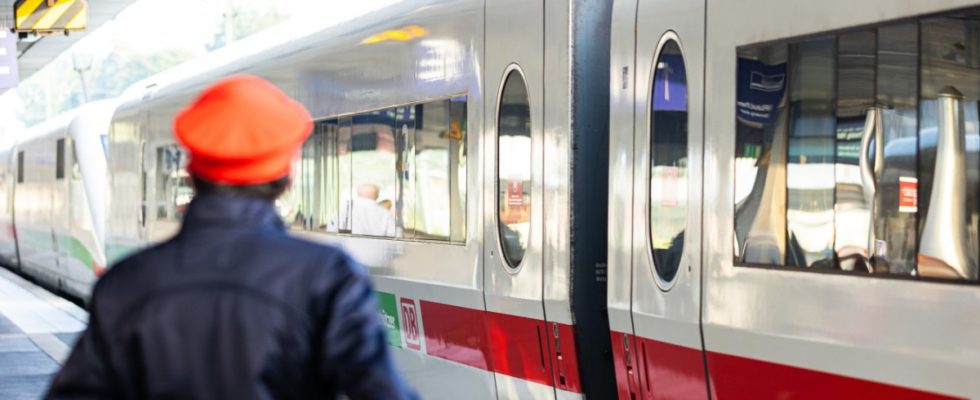With the Deutsche Bahn timetable change, passengers will benefit from some improvements in December. The company is increasing its long-distance transport offerings, particularly on the routes between Berlin and North Rhine-Westphalia and between Berlin and Munich, as the railway announced on Friday. The disruption-prone train splitting in Hamm, North Rhine-Westphalia, only occurs half as often as before.
The bad news: The chronic unreliability of long-distance transport will not change for the time being. In addition, rail customers have to prepare for higher prices. “In 2024, too, we will have to ask our passengers to be a little more patient than they and we would like,” said Michael Peterson, the railway board member responsible for long-distance transport, to the German Press Agency. “But we will begin the general renovation of the rail network next year.” This means step by step improvements to the overloaded infrastructure. However, greater reliability can only be expected from 2025. Nevertheless: “With the 2024 timetable, we are offering our passengers more new connections than we have had in 20 years,” emphasized Peterson.
The most important timetable changes at a glance:
Berlin-NRW: With an additional, two-hourly ICE line between Berlin and Cologne via Wuppertal, a long-distance train will run between the capital and Hanover every 30 minutes. According to the railway, the number of seats available on the entire route will increase by 20 to 25 percent. Due to the extra connection, train sharing in Hamm is only necessary half as often on the route. In addition, this will more often affect the new ICE 4 trains, which are said to have fewer coupling problems than the older ICE
Berlin-Munich: There will also be a half-hourly service between Berlin and Munich from December. The particularly fast Sprinter connection will be operated once an hour in the future. The Sprinter also travels between Nuremberg and Berlin three times a day in each direction without stopping. The travel time on the entire route is reduced to three hours and 45 minutes.
Nightjet: From December onwards, the Austrian Federal Railways (ÖBB) will operate a night train connection between Berlin and Paris and between Berlin and Brussels. The offer is initially available three times a week. From October 2024, the so-called Nightjet will be on the move every day.
In the regions: There will also be new offers between Leipzig, Jena and Nuremberg. In the future, five IC connections per day will be offered through the Saale Valley, it was said. So far there has only been one trip each. For the first time, Magdeburg will have a connection to Hamburg as well as more direct connections to Berlin and Rostock.
Time schedule: The timetable applies from December 10th, ticket sales begin on October 11th – also for trips during the Christmas period.
Prices: The timetable change in December will not only bring more offers, but probably also higher prices for long-distance transport for passengers. “Of course, we also have to think about our fares in view of the general price development,” said railway board member Peterson. “We will inform passengers about this in good time in October.”
Punctuality: The railway’s punctuality rate will not improve with the new timetable. The main reason remains the overloaded and aging rail network and the numerous construction sites that are required, which further slow down rail traffic. “This year, punctuality has also suffered due to the threshold renovations, which are having a major impact on the office,” said Peterson. Since the train accident in Garmisch-Partenkirchen last year, the railway has been checking and replacing hundreds of thousands of concrete sleepers. He “doesn’t see that happening to this extent in the coming year,” said the manager. But the infrastructure remains in urgent need of renovation.
Next year, the general renovation of dozens of rail corridors will begin with the modernization of the so-called Riedbahn between Frankfurt and Mannheim until 2030. The sections will be closed for around six months and renewed. The Riedbahn is one of the busiest routes in Europe. The railway therefore expects noticeable improvements in reliability after completion of the construction work there.

